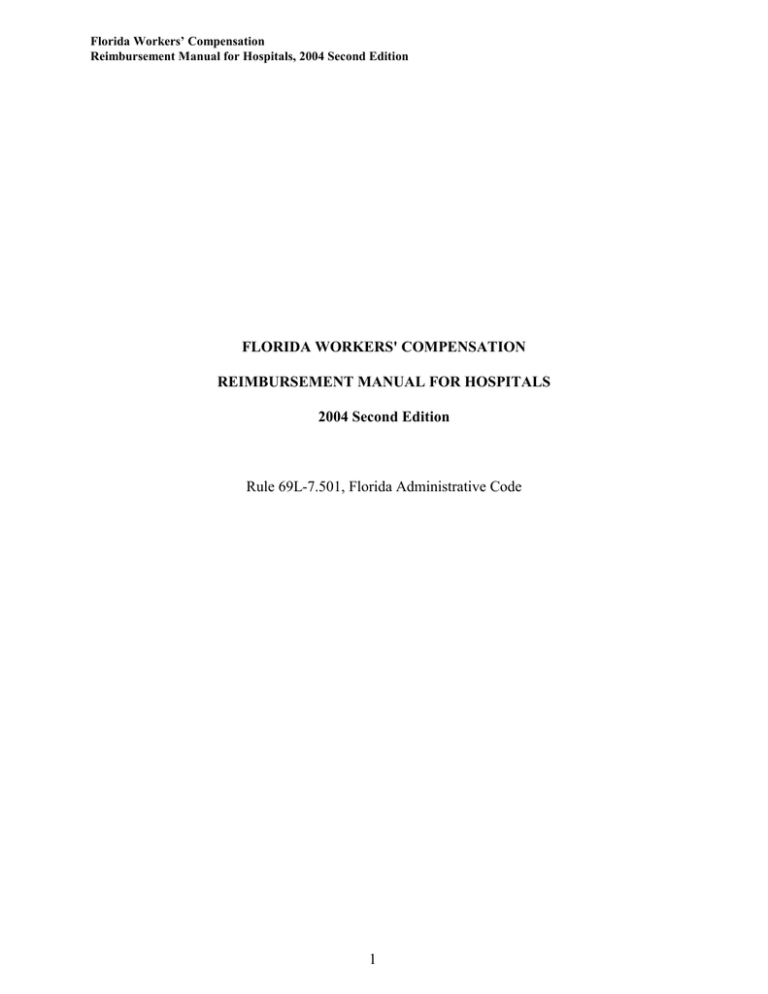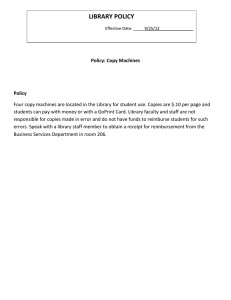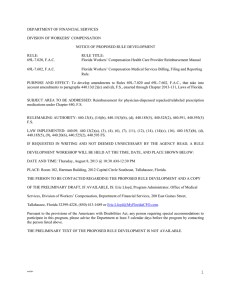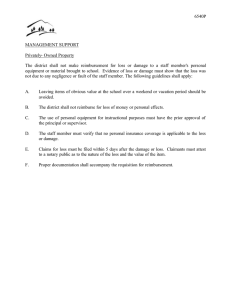FLORIDA WORKERS' COMPENSATION REIMBURSEMENT MANUAL FOR HOSPITALS 2004 Second Edition
advertisement

Florida Workers’ Compensation Reimbursement Manual for Hospitals, 2004 Second Edition FLORIDA WORKERS' COMPENSATION REIMBURSEMENT MANUAL FOR HOSPITALS 2004 Second Edition Rule 69L-7.501, Florida Administrative Code 1 Florida Workers’ Compensation Reimbursement Manual for Hospitals, 2004 Second Edition TABLE OF CONTENTS Page Title Section 1: Managed Care 3 Section 2: Publications Adopted by Reference 3 Section 3: Billing 3 Section 4: Authorization 3 Section 5: Precertification and Length of Stay 4 Section 6: Hospital Release of Information Form 4 Section 7: Medical Records 5 Section 8: Copy Charges for Medical Records 5 Section 9: Out-of-State Hospital Services 6 Section 10: Federal Facilities 6 Section 11: Reimbursement 6 Section 12: Resolving Underpayments or Overpayments 9 Appendix A: Definitions 11 Appendix B: Resource Documents 14 Index: 16 2 Florida Workers’ Compensation Reimbursement Manual for Hospitals, 2004 Second Edition Section 1: Managed Care. Under workers’ compensation managed care arrangements, a hospital may enter into various types of written agreements directly or indirectly with insurers to provide and to manage medically necessary remedial treatment, care and attendance to injured employees for an agreed upon contract price. The terms of an agreement may follow the specific requirements of this manual or may contain additional or different requirements. In the preceding text, the word insurer also means the designated authorizing entity in a managed care arrangement contract. Section 2: Publications Adopted by Reference. The standards in the following publications are adopted by reference (see Appendix B for ordering information): 1. Comprehensive Accreditation Manual for Hospitals: The Official Handbook (CAMH), 2004 edition. 2. Length of Stay by Operation, United States, 2002. 3. Length of Stay by Diagnosis, United States, 2002. 4. Florida's Workers' Compensation Health Care Provider Reimbursement Manual, 2004 Second Edition, Section XI, Part A and Appendix D. Section 3: Billing. The insurer shall utilize the Division’s Medical Services Billing, Filing, and Reporting rule (Rule 69L-7.602, Florida Administrative Code) to determine the hospital billing form, special billing or reporting instructions, and its responsibility for reviewing and requesting documentation to comply with s. 440.20(2)(b), F.S. (See Appendix B to obtain rule.) Section 4: Authorization. A. All requirements of this manual apply to hospital services provided to an injured employee within the state of Florida, outside of the state of Florida and in any federal facility. B. Hospital emergency services and care, defined in 395.002, F.S., do not require authorization at the time they are rendered. If the emergency medical condition or the care results in an emergency hospital admission of the injured employee, the hospital must notify the insurer within 24 hours by telephone. 3 Florida Workers’ Compensation Reimbursement Manual for Hospitals, 2004 Second Edition C. A hospital shall obtain authorization from the insurer prior to providing nonemergency outpatient services or the inpatient admission of an employee for a work-related injury. D. A hospital shall obtain authorization from the insurer and shall record the authorization in the injured employee's medical record or billing or financial record including the date on which authorization was requested and received. Also, the hospital shall include the name and title of the person authorizing medical services and the length of stay precertified by the insurer, if applicable. E. The hospital shall inform the insurer of any non-compensable conditions for which the injured employee will receive therapeutic or diagnostic services during the course of hospitalization and include the name and address of the responsible party for the non-compensable services. Section 5: Precertification and Length of Stay. A. When authorizing inpatient admissions, the insurer shall precertify the number of days of hospitalization for which reimbursement can be anticipated according to national length of stay standards incorporated by reference in Section 2 of this manual. B. When it is evident at the time of admission or during the stay that the precertified days will be exceeded, the hospital must inform the insurer and provide the opportunity for the insurer to approve additional reimbursement in order to avoid unnecessary disputes about overpayments or underpayments. Section 6: Hospital Release of Information Form. A. The hospital shall obtain a signed release of information form from each patient upon admission which meets the requirements of Chapter 395, Florida Statutes (F.S.). B. When the patient’s condition at the time of the admission prevents compliance with this requirement, the form should be signed by the patient or guardian, curator, or personal representative as soon as circumstances permit. C. If the patient refuses to sign the release of information form, the hospital must notify the insurer immediately. When this is not possible, the hospital must notify the insurer by close of business on the next regular business day. D. The patient’s record must include either the signed release of information form or the documentation of refusal to sign the form and the notification to the insurer of the refusal. 4 Florida Workers’ Compensation Reimbursement Manual for Hospitals, 2004 Second Edition E. Specific records cannot be disclosed without consent of the person to whom they pertain. These records include: 1. Mental health records (s. 394.4615, F.S.); 2. Records of substance abuse impaired persons (s. 397.501, F.S.); 3. The identity and test results of persons upon whom a test for human immunodeficiency virus has been made (s.381.004(3), F.S.). Section 7: Medical Records. The hospital shall maintain medical records according to Chapter 395, F.S., agency rules establishing criteria for problem-oriented medical record systems in hospitals, and standards of the Joint Commission on the Accreditation of Health Care Organizations (JCAHO), if so accredited. Section 8: Copy Charges for Medical Records A. If a hospital provides copies of medical records to the injured employee or injured employee's attorney, the hospital may charge the injured employee or the injured employee's attorney $.50 per page for paper medical records copied and the actual direct cost of copying x-rays, microfilm, or other non-paper medical records. No other copy charges or search charges may be charged to the injured employee as part of the services provided to the injured employee by the hospital. B. If a hospital provides copies to the insurer upon the insurer's written request under section 395.3025, F.S., the hospital may charge the following: 1. $1.00 per page for paper medical record. 2. $2.00 per fiche (microfiche) and other non-paper medical records. a. Actual sales tax and postage for mailing the copies to the insurer, and b. An additional fee of $1.00 per year for each year of copies of medical records requested, but no additional search or retrieval fee. C. The above charges for copies of medical records apply to each hospital and to any copy services providing copies to the insurer on behalf of the hospital. D. No charges shall be reimbursed for copies of the injured employee's medical record provided to the Division or the Agency for Health Care Administration. 5 Florida Workers’ Compensation Reimbursement Manual for Hospitals, 2004 Second Edition Section 9: Out of State Hospital Services. A. Hospital services, provided by an out-of-state hospital, require authorization from the insurer. B. A hospital outside of the state of Florida shall be reimbursed at either: 1. The amount agreed upon by the hospital and the insurer during authorization, or 2. When no amount is pre-approved, the greater of the reimbursement established under Florida’s Workers’ Compensation law or rules or the maximum payment amount provided under the workers' compensation statute of the state in which the hospital is located. Section 10 : Federal Facilities. A. Treatment provided in federal facilities requires authorization from the insurer. B. All requirements of this manual apply to hospital services supplied to an injured employee in a federal hospital except that federal facilities: . 1. Bill on their own billing form instead of the DWC-90 (UB-92); and 2. Are not subject to the reimbursement limitations of this rule. Section 11: Reimbursement. A. General. 1. The insurer shall comply with the provisions of s. 440.20(2)(b), F.S. upon receipt of a properly submitted DWC-90 as required in the Division’s billing rule and any specific additional documentation required by the insurer at the time authorization is given. 2. The insurer is not exempt from complying with the provisions of s. 440.20(2)(b), F.S., contingent upon completion of an on-site audit or the receipt or review of medical records not requested from the hospital when authorization is given. 3. The insurer, however, may disallow reimbursement for a specifically itemized service that does not appear to be medically necessary for authorized outpatient treatment or an authorized inpatient admission when charges exceed the stop loss point for an inpatient admission. 6 Florida Workers’ Compensation Reimbursement Manual for Hospitals, 2004 Second Edition B. Inpatient Charges. 1. Acute care hospitals and trauma centers shall be reimbursed on a per diem basis as follows: a. Inpatient services provided by an acute care hospital: (1) Surgical stay: $3,213.73 (2) Non-surgical stay: $1,906.89 b. Inpatient services provided by a trauma center: (1) Surgical stay: $3,214.66 (2) Non-surgical stay: $1,931.96 2. An insurer may not disallow any portion of the length of stay for an authorized inpatient admission except when documentation does not support medical necessity or when the length of stay exceeds the: a. Precertified days. b. Median length of stay (50 standards. th percentile) of national length of stay 3. When charges for inpatient services at either an acute care hospital or a trauma center exceed $50,000.00, the stop-loss method for reimbursement shall be used to reimburse the hospital instead of the established per diem. Reimbursement shall be at 75 percent of charges for medically necessary services. Charges for medically necessary services can be determined from an on-site audit. 4. Inpatient services provided at a rehabilitation hospital or a psychiatric hospital shall be reimbursed at 75 percent of charges for medically necessary services. 5. When non-compensable services are provided during an admission for compensable services and the length of stay for the non-compensable condition exceeds that required for the compensable condition, all charges for the additional length of stay are the patient’s responsibility and must not be reimbursed by the workers’ compensation carrier. 7 Florida Workers’ Compensation Reimbursement Manual for Hospitals, 2004 Second Edition C. Outpatient Charges. 1. All compensable services for hospital outpatient care shall be reimbursed at 75 percent of the hospital’s charges for medically necessary care with the following exceptions: a. Scheduled outpatient surgeries shall be reimbursed only 60 percent of the hospital’s charges. b. Scheduled non-emergency medically necessary radiology and clinical laboratory services not provided in conjunction with surgical care in item 1, shall be reimbursed according to the schedule of maximum reimbursement allowances (MRAs) which applies to non-hospital providers in the 2004 Health Care Provider Reimbursement Manual, Second Edition, Section XI, Part A, incorporated pursuant to rule 69L7.020, Florida Administrative Code (F.A.C.). (1) Insurers shall adjust only clinical laboratory and radiology outpatient services identified in Form Locator 42 of the DWC-90 (UB-92) billed under the following revenue codes: 0300-0309,03200329,0330-0339,0340-0349,0350-0359,0400-0409, and 06100619. (2) Insurers shall determine the non-hospital provider MRA in Section XI, Part A that applies for the technical component of the CPT-4 or HCPCS code, reported by the hospital in Form Locator 44 of the DWC-90 (UB-92). (3) Insurers shall determine the number of units of service reported in Form Locator 46 of the DWC-90 (UB-92) by the hospital for each CPT-4 or HCPCS code. (4) Insurers shall multiply the MRA determined in item b above by the units of service to determine the outpatient hospital maximum reimbursement allowance for the specific radiology or clinical laboratory services. c. All medically necessary physical, occupational, and speech therapy services shall also be adjusted to the schedule of MRAs which applies to non-hospital providers in the 2004 Health Care Provider Reimbursement Manual, Second Edition, Section XI, Part A and Appendix D incorporated pursuant to rule 69L-7.020, Florida Administrative Code (F.A.C.). 8 Florida Workers’ Compensation Reimbursement Manual for Hospitals, 2004 Second Edition (1) Insurers shall adjust only outpatient physical therapy, occupational therapy, and speech therapy services identified in Form Locator 42 of the DWC-90 (UB-92) billed under the following revenue codes: 0420-0429,0430-0439,0440-0449,0930-0932. (2) Insurers shall determine the non-hospital provider MRA which applies based on the workers’ compensation unique code, the CPT code or the HCPCS code reported by the hospital in Form Locator 44 of the DWC-90 (UB-92). (3) Insurers shall determine the number of units of physical therapy, occupational therapy, or speech therapy services reported by the hospital for each procedure code in Form Locator 46 of the DWC90 (UB-92). (4) Insurers shall multiply the MRA in Section XI, Part A, by the units of service to determine the outpatient hospital maximum reimbursement allowance for the specific physical, occupational or speech therapy services. (5) Provisions of Section VIII, Physical Medicine and Rehabilitation Services, of the 2004 Health care Provider Reimbursement Manual, Second Edition shall also apply to outpatient therapy reimbursement and are hereby incorporated pursuant to rule 69L7.020, F.A.C. 2. Insurers shall apply non-emergency reimbursement provisions when a hospital does not report revenue codes 0450-0459 in Form Locator 42 or when the insurer determines that revenue codes 0450-0459 are billed inaccurately. 3. Insurers shall not reimburse more than 23 hours for outpatient observation services billed under revenue codes 0762 and 0769 in Form Locator 42 of the DWC-90 (UB-92). Section 12: Resolving Underpayments and Overpayments. A. When necessary to verify accurate payment of hospital charges, either the insurer or hospital may request an on-site audit to determine the medical necessity of the inpatient length of stay or any specifically itemized outpatient charges. The audit may include a review of the hospital’s Charge Master to verify that the charges for services on the itemized statement are correct. B. If it is necessary to conduct an on-site audit, the insurer or the hospital must request the audit in writing within 30 calendar days from the date of receipt of either the completed DWC-90 from the hospital or the payment and the explanation of bill review (EOBR) from the insurer, respectively. 9 Florida Workers’ Compensation Reimbursement Manual for Hospitals, 2004 Second Edition C. Within 30 calendar days of receipt of a written request for an audit, a hospital and the insurer shall schedule a mutually acceptable date for the audit without any conditions for payment of an audit or administrative fee. D. When it is determined that an inaccurate charge, an underpayment or an overpayment has been made, the owing party shall reimburse the other party the uncontested amount within 30 calendar days of receipt of written documentation of the audit results. Contested final reimbursement amounts may be resolved by petitioning the Agency for Health Care Administration pursuant to s. 440.13(7), F.S. and Rule 59A-31.002, F.A.C (See Appendix B to obtain rule.) E. Failure of either party to identify inaccurate charges, overpayments or underpayments during the periods of time and according to the above process shall constitute a waiver of the right to reimbursement at a later date. 10 Florida Workers’ Compensation Reimbursement Manual for Hospitals, 2004 Second Edition APPENDIX A DEFINITIONS 11 Florida Workers’ Compensation Reimbursement Manual for Hospitals, 2004 Second Edition Appendix A: Definitions. (1) “Admission” means an injured employee is admitted to a hospital for inpatient services when, based on the admission order from the treating physician, the injured employee will require an overnight stay for medical care (2) “Agency” means the Agency for Health Care Administration as it is defined in s. 440.02(3), F.S. (3) “Authorization” means the approval given to a hospital or federal facility by the insurer or designated party for the provision of medical services to an injured employee who has had a compensable injury (4) “Billing” means the process by which a health care provider submits a claim to an insurer, to receive reimbursement for medical services provided to an injured employee (5) “Charge” means the dollar amount billed (6) “Charge Master” means a comprehensive coded list developed by a hospital or an ambulatory surgical center representing usual charges for specific services (7) “Current Procedural Terminology” (CPT) means the American Medical Association (AMA) reference document (HCPCS Level I) containing descriptive terms to identify codes for reporting medical procedures and services (8) “Division” means the Division of Workers’ Compensation of the Department of Financial Services as defined in s.440.02(14), F.S. (9) “DWC-90” means the current hospital billing form, the UB-92, pursuant to s. 627.647, F.S. (10) “Explanation of Bill Review” (EOBR) means the codes and written explanation of an insurer’s reimbursement decision sent to the health care provider and submitted to the division (11) “HCPCS (Healthcare Common Procedure Coding System) National Level II Codes” (HCPCS) means the Center for Medicare and Medicaid Services (CMS) reference document listing descriptive codes for reporting professional services, procedures, and supplies provided by health care providers (12) “Health Care Provider” means a provider as defined in s.440.13,F.S. (13) “Hospital” means a health care facility as defined in Chapter 395, F.S. (14) “Insurer” means any entity as defined in s. 440.02, F.S. 12 Florida Workers’ Compensation Reimbursement Manual for Hospitals, 2004 Second Edition (15) “Itemized Statement” means a detailed listing of hospital provided services and supplies, including the quantity and charges for each service or supply. (16) “Length of Stay Standards” means the Length of Stay by Operation, United States, 2002 and the Length of Stay by Diagnosis, 2002 adopted by reference in Section 2 of this manual. (17) “Medical Record” means the patient records maintained in accordance with form and content required under Chapter 395, F.S. (18) “Medically Necessary or Medical Necessity” means any medical service or medical supply which meets the definition of the terms according to s.440.13(1)(l),F.S. (19) “Per Diem” means a reimbursement allowance based on a fixed rate per day which is inclusive of all services rather than on a charge by charge basis (20) “Physician” means a physician licensed under chapter 458, an osteopathic physician licensed under chapter 459, a chiropractor licensed under chapter 460, a podiatrist licensed under chapter 461, an optometrist licensed under chapter 463, or a dentist licensed under chapter 466, each of whom must be certified by the agency as a health care provider (s. 440.13 (1) (r), F.S.) (21) “Stop-Loss Method or Stop-Loss Point” means an independent reimbursement methodology used in place of and not in addition to per diem reimbursement for inpatient admission to an acute care hospital or a trauma center. The methodology applies when total hospital charges reach the $50,000.00 threshold and allows reimbursement of 75 percent of the hospital’s charges for only medically necessary services incurred during the patient’s entire stay in the hospital (22) “On-Site Audit” means an audit conducted at the hospital which compares the charges listed on an itemized statement accompanying the DWC-90 (UB-92) with the charges listed on the hospital’s charge master. It includes verifying that services were medically necessary, related to the compensable admission, ordered and provided to the patient based on the documentation in the patient’s medical record 13 Florida Workers’ Compensation Reimbursement Manual for Hospitals, 2004 Second Edition APPENDIX B RESOURCE DOCUMENTS 14 Florida Workers’ Compensation Reimbursement Manual for Hospitals, 2004 Second Edition Appendix B: Resource Documents 1. Comprehensive Accreditation Manual for Hospitals: The Official Handbook (CAMH), 2004. Joint Commission on Accreditation of Healthcare Organizations, One Renaissance Boulevard, Oakbrook Terrace, Illinois 60181. Telephone: (630) 792-5800. Order online at http://www.jcrinc.com/infomart or by calling Joint Commission Resources toll free at (877) 223-6866. 2. Length of Stay by Operation, United States, 2002. Solucient, 1800 Sherman Avenue, Evanston, Illinois 60201. Order online at http://www.solucient.com/ or toll free at (800) 568-3282. 3. Length of Stay by Diagnosis, United States, 2002. Solucient, 1800 Sherman Avenue, Evanston, Illinois 60201. Order online at http://www.solucient.com/ or toll free at (800) 568-3282. 4. UB-92, National Uniform Billing Data Element Specifications as Adopted by the Florida State Uniform Billing Committee, updated January 2004, (UB-92 Manual). Florida Hospital Association, Post Office Box 531107, Orlando, Florida 32853-1107. Telephone: (407) 422-5948. 5. Rule Chapter 69L-7.602, Florida Administrative Code, Workers’ Compensation Medical Services Billing, Filing, and Reporting Rule. Obtain the rule free of charge online at http://www.fldfs.com/wc under Rules and Forms. 6. Florida's Workers' Compensation Health Care Provider Reimbursement Manual, 2004 Second Edition, Department of Financial Services Document Processing Section, 200 East Gaines Street, Tallahassee, Florida 32399-0311. Obtain the manual free of charge online at http://www.fldfs.com/wc under Publications or purchase in hardcopy according to the Manual Purchase Instructions on the Document Order Form at the same site. 7 . Rule Chapter 59A-31.002, Florida Administrative Code, Disputed Reimbursement Rule. Obtain the rule free of charge online at http://fac.dos.state.fl.us/faconline/Chapter59.pdf. 8 . List of State Approved Trauma Centers. Obtain free of charge online at http://www.doh. state.fl.us/ems/Trauma/verification.html. 15 Florida Workers’ Compensation Reimbursement Manual for Hospitals, 2004 Second Edition INDEX 16 Florida Workers’ Compensation Reimbursement Manual for Hospitals, 2004 Second Edition INDEX A Acute Care Hospitals, 7 Authorization, 3 Documentation, 4 Emergency Services, 3 Non-Emergency Services, 4, 8 Florida 2004 Workers’ Compensation Health Care Provider Reimbursement Manual, Second Edition, 3, 8-9, 15 H HCPCS Code, 8-9,12 HIV Records, 5 B Billing rule, 3 C Charge Master, 9, 12 Clinical Laboratory, 8 Comprehensive Accreditation Manual for Hospitals: The Official Handbook (CAMH, 2004 Edition), 3 Contested final reimbursement, 10 Copy Charges for medical records, 5 Agency for Health Care Administration, 5 Division of Workers’ Compensation, 5 Injured Employee, 5 Insurer, 5 Multiple years, 5 Non-paper records, 5 Paper records, 5 Search fees, 5 D Definitions, 11 Documentation Authorization requests, 4 Emergency Services, 3 Release of Information, 4 DWC-90, 8–9, 12 I Inpatient per diem, 7 Insurer, 12 Itemized statement, 9, 13 J Joint Commission on the Accreditation of the Health Care Organization (JCAHO), 5 L Length of Stay by Diagnosis, United States, 2002, 3, 15 Length of Stay by Operation, United States, 2002 , 3, 15 M Managed Care, 3 Medical Records, 5 Copy Charges, 5 HIV, 5 Maintenance, 5 Mental Health, 5 Substance Abuse, 5 Mental Health Records, 5 N E Emergency Medical Condition, 3 Emergency Services, 3 F Federal Facilities, 6 Authorization, 6 Exceptions, 6 Non-compensable condition, 4 Non-emergency services, 4, 9 Non-hospital providers, 8 Non-paper medical records, 5 Non-surgical stay, 7 O Observation Services, 9 Occupational Therapy, 8-9 17 Florida Workers’ Compensation Reimbursement Manual for Hospitals, 2004 Second Edition On-site audits, 9 Scheduling, 9 Out-of-State Services, 6 Authorization, 6 Reimbursement, 6 Outpatient Observation, 9 Outpatient Services, 8 Overpayments, 9 P Per diem, 7 Physical Medicine and Rehabilitation, 9 General Policy, 9 Physical Therapy, 8-9 Precertification requirements, 4 Psychiatric Hospitals, 7 R Radiology, 8 References, 15 Rehabilitation Hospitals, 7 Reimbursement, 6-9 Acute care hospitals, 7 Insurer payment responsibility, 6 On-site Audits, 9 Outpatient services, 8 -Clinical laboratory, 8 -Non-emergency services, 8 -Observation services, 9 -Occupational therapy, 8 -Physical therapy, 8 -Radiology, 8 -Speech therapy, 8 -Surgery, 8 Stop-loss method/stop-loss point, 7, 13 Trauma centers, 7 Reimbursement Disputes, 9 Release of Information, 4 Documentation, 4 Prohibited disclosure, 5 Refusal to sign, 4 Resolving Underpayments and Overpayments, 9 Charge Master, 9, 12 Contested final reimbursement, 10 On-site audit, 9 Resource documents, 14 Revenue codes, 8 S Scheduling on-site audits, 9 Search fees, 5 Speech Therapy, 8 Substance Abuse Records, 5 Surgery, inpatient, 7 Surgery, outpatient, 8 T Technical component, 8 Trauma centers, 7 U UB-92, 8-9 Uncontested amount, 10 Underpayments, 9 Unique codes, 9 W Waiver of right, 10 X X-rays, 8 18


